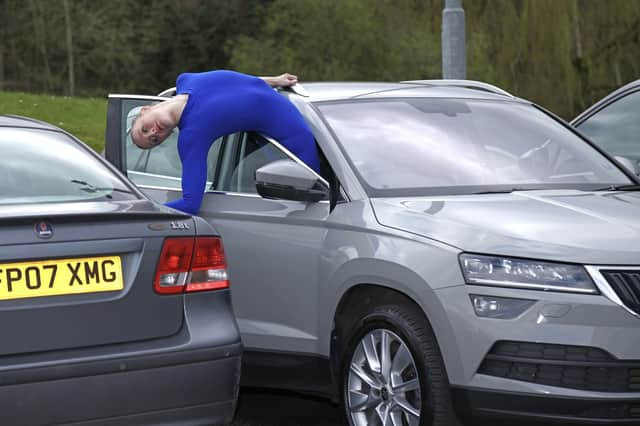Wider modern cars mean and 1970s car park dimensions mean drivers struggle to get in and out


Drivers are struggling to get in and out of parked cars because of the increasing size of their vehicles, according to a new study.
Many manufacturers have increased the width of vehicles despite the size of most UK car park spaces being based on guidelines dating back to the 1970s, research by Churchill Motor Insurance found.
Advertisement
Hide AdAdvertisement
Hide AdAnalysis of 10 popular family car models revealed their average width has increased from 168cm when they were first launched to 180cm.
Guidelines issued by the British Parking Association recommend that spaces are 240cm wide, meaning there is typically just 30cm between each side of a parked car and the edge of a bay.
The study found the width of a Ford Fiesta has increased from 155cm, when it was first introduced, to 174cm.
Other examples of expanding cars include the Vauxhall Corsa (up 24cm to 177cm), the Nissan Qashqai (up 6cm to 184cm) and the Hyundai Tucson (up 4cm to 187cm).
Two out of five (40 per cent) respondents to a survey commissioned by Churchill Motor Insurance said they have to squeeze themselves into their car when parked next to another vehicle at least once a month.
Some 22 per cent claimed they have resorted to climbing into their parked car via the boot on at least one occasion.
Nearly a third (32 per cent) of those questioned said they drive a bigger vehicle than five years ago.
The most common reasons for doing so included wanting more internal space for comfort, liking the design of a larger vehicle, and requiring more space for leisure and work equipment.
Advertisement
Hide AdAdvertisement
Hide AdNicholas Mantel, head of Churchill Motor Insurance, said: “Ask almost any driver and they will have a story about having to creatively escape their car due to a lack of space when in a car park, even crawling out through the boot.
“Widening cars combined with parking bays that haven’t been redesigned to accommodate today’s models means motorists all over the country are at risk of damaging their cars, through no fault of their own.”
The company also estimated that damage caused by vehicles hitting a wall, bollard or another vehicle while attempting to get in or out of parking bays costs UK motorists £424 million every year.
RAC head of policy Simon Williams said: “After spending ages looking for a place to park, it can be very frustrating for drivers to discover there’s not enough room to get out of their vehicle, not least if you have a family in tow, have mobility issues or need room to use a wheelchair.
“Returning to find damage from a door being opened onto your vehicle is even more annoying due to the hassle and expense of having to get dents and scratches repaired.
“The problem centres on modern vehicles becoming wider due to the introduction of side impact protection technology.
“Operators are faced with the dilemma of having to repaint spaces to accommodate these larger vehicles, which is especially difficult at some older multi-storey car parks where space is already restricted.
“Unfortunately, this would lead to an overall reduction in the total number of spaces available and an inevitable increase in charges to compensate for the loss of revenue.”
Comments
Want to join the conversation? Please or to comment on this article.